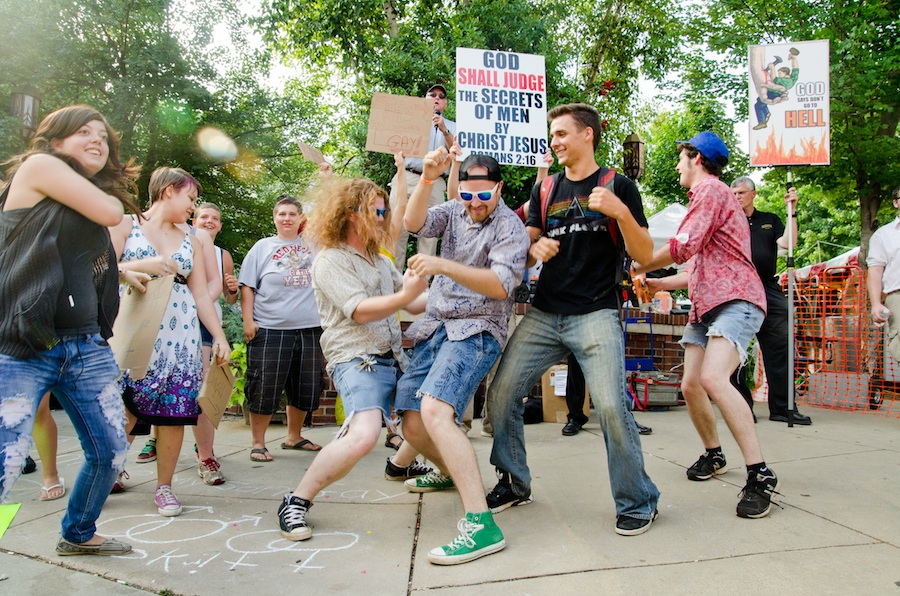The last street-preacher showdown: Longtime downtown street festival Bele Chere was a casualty of uncertain budget times and Asheville City Council’s changing goals, with the 2013 festival the last after over three decades. Here, Ashevilleans mock a street preacher, a regular occurrence at the annual festival. Photo by Max Cooper.
“Tumultuous” might be the best way to describe the year the Asheville City Council had in 2013, marked by financial turmoil, the first major tax hike in more than a decade, the demise of a long-standing festival, and major fights with the Legislature in Raleigh.
The first half of the year was dominated by budgetary wrangling, exacerbated by a good deal of uncertainty over how much revenue city officials might expect. State policies and budgets have a significant impact on what Asheville ends up with, and major debates in Raleigh (the governor, state House and Senate all had conflicting proposals) forced city staff to craft widely varying spending plans. The General Assembly didn’t resolve the differences until late July — weeks after the city had to finalize its budget. Meanwhile, a frustrated City Council held special forums to take their case directly to residents.
Council also faced internal debates about what items most merited city investment and what long-established practices they were willing to change.
One notable casualty was Bele Chere, the city’s flagship festival. Council members concluded that the resources consumed by the massive midsummer street party, a perennial source of both praise and complaints among locals, could be better spent elsewhere. City leaders also broke a long aversion to tax increases, passing a substantial one to help fund a number of projects, including infrastructure, affordable housing and (most controversially) Asheville Art Museum renovations. In the end, the state budget’s impact proved less dire than predicted.
But that didn’t mean smooth sailing with Raleigh. Among other things, state lawmakers forcibly transferred control of the water system to the Metropolitan Sewerage District and excluded the city from Buncombe County’s new Culture and Recreation Authority. The water dispute wound up in court: The city filed a lawsuit alleging that the state’s new law is unconstitutional, and the transfer is on hold until a ruling is issued.
During the summer, a series of emails among state legislators, city staff and elected officials revealed behind-the-scenes discussions aimed at resolving the conflict, and also indicated that Rep. Tim Moffitt was considering filing a bill to overhaul city elections, which didn’t happen. Yet.
Although the tax increase was criticized by some candidates for City Council and mayor, the November elections saw supporters of the city’s current course swept to victory by considerable margins. The coming year promises more budget wrangling and some major fights over proposed developments, along with the possibility of more contention with Raleigh when the Legislature re-convenes in the spring. Stay tuned.




Before you comment
The comments section is here to provide a platform for civil dialogue on the issues we face together as a local community. Xpress is committed to offering this platform for all voices, but when the tone of the discussion gets nasty or strays off topic, we believe many people choose not to participate. Xpress editors are determined to moderate comments to ensure a constructive interchange is maintained. All comments judged not to be in keeping with the spirit of civil discourse will be removed and repeat violators will be banned. See here for our terms of service. Thank you for being part of this effort to promote respectful discussion.